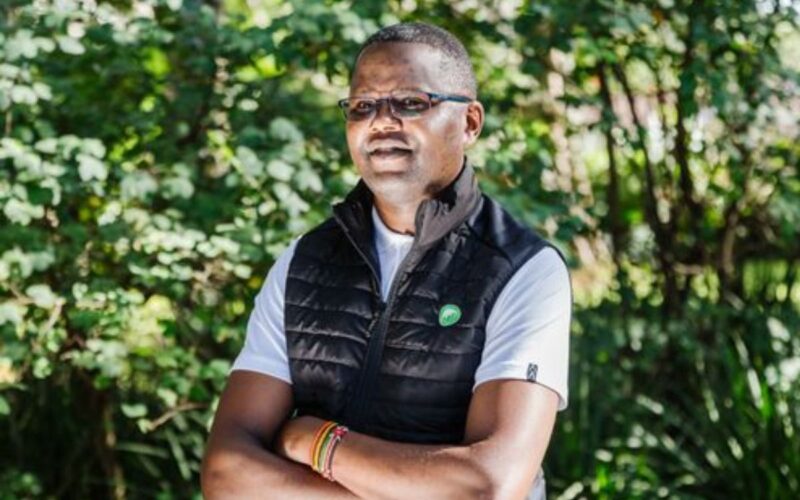The irony is almost too perfect to be real. On November 12, 2025, Ezra Olubi celebrated his 39th birthday—a man who had quite literally made it. Co-founder of Paystack, Nigeria’s first unicorn fintech startup. Chief Technology Officer of a company acquired by Stripe for over $200 million. Recipient of the Officer of the Order of the Niger (OON), one of Nigeria’s highest civilian honors. With a personal net worth of an estimated $40 million.
A national hero. A tech pioneer. An icon.
Twenty-four hours later, he had deleted his Twitter/X account and gone silent as the internet erupted with calls for his arrest, prosecution, and public disgrace.
This is the story of how it all came crashing down—and the woman who lit the match.
Act I: The Woman Who Refused To Be Silent
Her name is Max Obae, though most people know her as @makispoke on X (formerly Twitter)
A Nigerian-born American financial professional and venture capitalist based in New York, Max describes herself as “unọ ndū. a disobedient woman. where finance meets philosophy. igbo-american. angel investor”.
She’s not someone who minces words. Her Twitter timeline is a testament to that—sharp observations about Nigerian men, power dynamics, feminism, and the contradictions of diaspora life. With 30,000 followers and a Substack newsletter, she’s built a reputation as someone who says what others only think.
But what she said on November 11, 2025, changed everything.
Max made several serious accusations against Olubi, citing alleged mistreatment of domestic staff, workplace misconduct, and manipulative behavior in a personal relationship. She accused Olubi of misogyny, abuse, and sexual exploitation, ending their relationship via an email with its subject titled ‘Severance’.
The initial post didn’t name him directly. But anyone paying attention knew exactly who she meant.
In a follow-up tweet, Max wrote: “This is precisely why. I’ve known this person since i was 19 years old as a Twitter mutual. I admired what I considered to be their bravery until reconnecting with them in late 2023 and experiencing the SHOCKING and UNCONSCIONABLE levels of misogyny and psychological abuse”.
She had known him for years. Admired him, even. Until she didn’t.
Act II: The Polyamorous Arrangement That Wasn’t What It Seemed
To understand how we got here, you need to go back to February 2024.
That’s when Ezra Olubi and his partners celebrated their love and shared photos on the platform. The three attended a friend’s wedding abroad. Ezra, who wore an upside-down crucifix in one of the photos, was pictured with Max and NK.
“The delicious disobedience of it all,” Max wrote as she shared their photos.
Ezra, the co-founder of Paystack, also shared the photos and wrote: “triple income, no kids”.
It looked progressive. Modern. A polyamorous “polycule” where Olubi was in a romantic relationship with two women who were also dating each other X. In a country like Nigeria, where homosexuality is criminalized and traditional values reign supreme, it seemed like an act of radical freedom.
But behind the Instagram-perfect photos, something else was happening.
Maki alleged that Ezra pretended to be gay to lure feminists into his circle and slowly break the feminism out of them, through depressing humiliation rituals, using them as sex objects, and keeping them in check with money.
Read that again.
According to Max, this wasn’t a progressive arrangement between equals. It was a calculated manipulation—a wealthy tech bro using identity politics and money to control women who thought they were entering something liberating.
When asked how she “allowed” it, Max responded: “have you met nigerian men? especially wealthy ones? talmbout ‘allowed’ they literally think they are ‘God'”.
The Twitter handle Ezra used? @0x. But some called him something else: “God.”
Act III: The Digital Archaeology of a Predator
Once Max’s allegations hit Twitter, the internet did what the internet does best: it went digging.
And what it found was horrifying.
The tweets, posted between 2010 and 2017 on Mr Olubi’s verified handle @0x (now deactivated), include explicit references to sexual acts with animals, jokes about paedophilia, and claims of knowingly transmitting HIV and Hepatitis B.
In one widely circulated screenshot dated 2012, the Paystack CTO described himself as a “cat lover” in his bio while making graphic remarks about sexual intercourse with cats. Several tweets also appeared to make light of child sexual abuse, including a 2014 post claiming, without any medical basis, that “sex with a minor cures HIV”.
This wasn’t edgy humor. This wasn’t youthful indiscretion.
These were statements about bestiality. About pedophilia. About knowingly transmitting fatal diseases.
Made by someone who would go on to become a national honoree. Someone trusted with building financial infrastructure for millions of Africans. Someone who took the stage at tech conferences and spoke about innovation, inclusion, and the future.
Maki also revealed that Ezra allegedly operated a burner account under the name ‘Akeem’, which began deleting tweets on Wednesday—the same day Max’s allegations went public.
Someone knew this was coming. Someone had been preparing.
His X account was deactivated on Wednesday afternoon. Still, multiple users had already archived the controversial tweets, with one repository on GitHub titled “Ezra Olubi Evidence Archive” gaining thousands of views.
The internet never forgets. And Nigeria’s Twitter was not about to let this go.
Act IV: The Silence That Screams
As of this writing—more than 48 hours since the scandal broke—Ezra Olubi has not issued any public statement.
Neither has Paystack.
Neither has Stripe.
Neither has his co-founder, Shola Akinlade.
Neither have any of his investors.
Ezra Olubi’s silent retreat by deleting his @0x account is unacceptable. As a corporate leader and national honouree, his fiduciary duty demands public transparency and accountability.
The lack of a clear response from Olubi or Paystack/Stripe has turned social media into a courtroom. On X and other platforms, thousands of users are demanding immediate and decisive action.
But there’s another layer to this silence that makes it even more damning.
The confirmed allegations against the Paystack CTO included: Sexual Misconduct with a Subordinate: Engaging in sexual relationships with employees under his professional authority, a critical breach of corporate ethics and power dynamics. Systemic Misogyny: A pervasive pattern of demeaning attitudes and actions toward women. Contempt for the Underprivileged: Routinely talking down on domestic workers and individuals he perceived as intellectually inferior, revealing a deeply condescending class bias that contradicts the inclusive mission of the tech sector.
Workplace sexual misconduct. Power abuse. Class contempt.
Note: There is a report that Ezra Olubi has been suspended by Paystack as of the time of publishing this article, and an internal investigation will be conducted.
Act V: The National Reckoning
In 2022, the late former President Muhammadu Buhari awarded him the Officer of the Order of the Niger (OON) national honour in recognition of his contributions to Nigeria’s fintech industry.
The OON. A mark of exceptional service to the nation.
Now, Nigerians are asking: what kind of nation gives its highest honors to someone with this documented history?
Many Nigerians on social media have tagged the Nigeria Police Force and the Office of the President, demanding investigation and possible prosecution under Nigeria’s Criminal Code, which prescribes up to 14 years imprisonment for bestiality and severe penalties for child defilement.
The calls aren’t just coming from anonymous Twitter users. Prominent voices across Nigerian civil society—feminists, human rights activists, tech ecosystem participants, and everyday citizens—are demanding accountability.
“This isn’t about cancel culture,” one prominent Nigerian tech journalist told Techmoonshot on condition of anonymity. “This is about whether we’re serious about the values we claim to hold. You can’t build an ecosystem on inclusion and fairness while protecting someone with this track record.”
Act VI: Stripe’s $200 Million Problem
The scandal immediately became a global issue because of Paystack’s acquisition by Stripe in October 2020. As a co-founder and CTO, Ezra Olubi is a key executive and board member of the Stripe-owned Paystack. His continued presence and ethical conduct are intrinsically tied to the reputation and stability of both Paystack and Stripe. The nature of the misconduct exposes the global corporation to severe reputational damage and legal liability.
Stripe, the Silicon Valley darling valued at over $50 billion, now faces uncomfortable questions:
- What due diligence was conducted before the acquisition?
- Were these tweets accessible during that process?
- What workplace investigations, if any, were conducted?
- What does Stripe’s continued silence signal about its values?
Stripe’s founders, Patrick and John Collison, personally championed the Paystack acquisition as a cornerstone of their African expansion strategy. They spoke eloquently about supporting African innovation, empowering local entrepreneurs, and building inclusive financial infrastructure.
Now, their biggest African investment is mired in allegations of abuse, manipulation, and criminal conduct.
The looming question for the global tech community is: Will Stripe allow an executive with this documented public history to remain on the board of one of its subsidiaries, or will corporate governance prevail?
Act VII: The Ecosystem’s Moment of Truth
This isn’t just about one man. It’s about what kind of ecosystem Nigeria—and by extension, Africa—wants to build.
Nigerian tech has spent years positioning itself as world-class. Y Combinator-backed startups. Unicorn valuations. Exits to global giants. A narrative of innovation, disruption, and transformation.
But what happens when the people at the top of that ecosystem are accused of the very behaviors that undermine everything it claims to stand for?
“We have a choice to make,” said a venture capitalist who has invested in multiple African startups. “Either we take this seriously and demand real accountability, or we prove that all our talk about values is just marketing. The world is watching.”
The implications extend far beyond Paystack:
For Founders: If someone like Ezra Olubi can rise to the top despite this history, what message does that send about ethical standards?
For Employees: If workplace sexual misconduct and power abuse are tolerated at the executive level, how safe can employees ever feel?
For Investors: If due diligence missed this, what else is being missed in African tech deals?
For Customers: Should millions of Nigerians trust their financial transactions to a company led by someone facing these allegations?
For Nigeria: Can a country serious about economic development and global competitiveness afford to give its highest honors to people accused of these acts?
Act VIII: Max Obae’s Courage
Let’s be clear about something: Max Obae knew what she was doing when she went public.
She knew she’d be attacked. Called bitter. Accused of seeking attention. Dismissed as a vindictive ex.
She knew that in Nigeria—where women who speak up are routinely silenced, shamed, and blamed—coming forward would make her a target.
She did it anyway.
“Nigerians do not like challenge to authority. We do not like people speaking up for themselves, for their rights. And this cuts across all classes of Nigerians. If you dare stand up for your rights, the majority of Nigerians will be against you”, she once tweeted.
She knew the cost. She paid it anyway.
Because some things matter more than being liked. Some truths matter more than being comfortable.
And sometimes, the only way forward is through the fire.
Epilogue: What Happens Next
As this story goes to press, several scenarios are in play:
Legal: Nigerian authorities could launch criminal investigations. International legal exposure may emerge if allegations span multiple jurisdictions.
Corporate: Stripe and Paystack must decide whether Olubi can remain. Every hour of silence makes their position more untenable.
Financial: Shareholder lawsuits, board actions, and reputational damage could threaten Olubi’s estimated $40 million net worth.
Ecosystem: The Nigerian tech community faces a defining choice about what it stands for and who it protects.
Cultural: This moment could mark a turning point in how Nigerian society treats powerful men accused of abuse—or it could be another example of money and influence shielding the powerful from consequences.
But here’s what we know for certain:
The boy who became a tech god has fallen. The question now is whether the system that elevated him will finally demand accountability—or whether money, power, and silence will once again carry the day.
Max Obae bet her reputation that Nigerians would choose accountability.
The world is waiting to see if she was right.













Comments 2